When Philippine health workers end their daily hospital shifts, they trade the risks of COVID-19 for the risks that they could have bleach thrown in their faces or be chased from public areas.
Many workers report they are being evicted from homes, refused rides on buses, and kicked out of restaurants as their fellow citizens worry about coming into contact with them and contracting the ailment caused by the coronavirus.
Critics say the disregard goes all the way to the top, with President Rodrigo Duterte saying these health professionals are “lucky” to die for the nation, even as he condemns the discrimination.
The Department of Health has said it would investigate the treatment of health workers. And the capital city of Manila has approved an ordinance outlawing discrimination against workers and COVID-19 patients. The recently approved ordinance calls for a fine of nearly $100 and six months in prison.
“We are receiving reports of our health care workers around the country being attacked physically, including being thrown bleach and splashed with chlorine,” the department said in a statement. “Additionally, there are reports of health care workers being refused access to basic services such as public transport and laundry, blocked and fined at checkpoints and evicted from their homes.”
In February, the Philippines became the first nation to report a death from COVID-19 outside of China, where it first emerged. Since then, the virus has spread to infect 3,764 people in the Southeast Asian nation, leading to nearly 180 deaths at last report and threatening to overwhelm the health care system.
As in the Philippines, health workers have been infected or killed while fighting the virus in nations from France to Vietnam to Pakistan. In the United States, they complain of being dismissed for protesting their hospitals’ hygiene policies; in China, one of the earlier deaths was of a doctor who tried to warn of the coming emergency.
The Philippines faces a lack of gloves, surgical masks and coveralls which the government is moving to source now for workers. Local health care workers have tried to improvise, such as by making facial coverings for themselves.
“Nothing will happen for us if we always wait for supplies or donations from abroad," Senator Imee Marcos said.
Marcos called on the Department of Health, along with the Department of Trade and Industry, to expedite the approval process for businesses that have made proposals to supply personal protective equipment, or PPE.
On Monday, Duterte approved an order that gives health workers an extra 25% in pay, including for part-time and casually employed workers.
He also warned citizens last week not to harass health care workers and said police would intervene if they witnessed such discrimination.
“These acts cannot be tolerated,” the Department of Health said. It also sought to assure the public that it should not worry about becoming infected from workers, saying, “As medical professionals, our health care workers are taking extra precautions to ensure infection prevention and control.”




